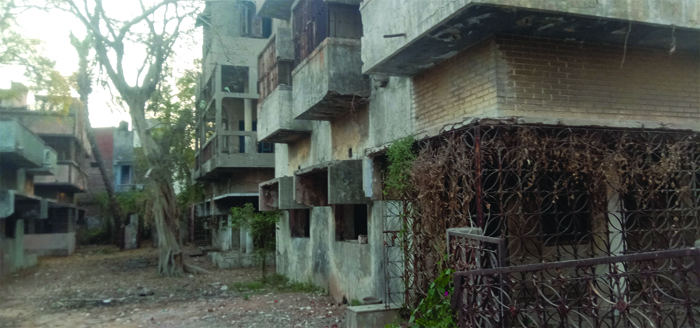SYED KHALIQUE AHMED
Gulberg Society in Hindu-dominated Meghaninagar area witnessed gangrape of several women and the brutal killing of 69 of its residents, including former Congress MP Ehsan Jafri during February-March 2002 genocide, lies in ruins even after 20 years. Of those killed, 35 were burnt alive.
While the victim-survivors have not come back to occupy their houses, most of which have turned into a dilapidated condition, they face a double whammy as there are no takers for the society’s real estate property. The burnt houses of the society with the inside walls of the homes still covered with soot are reminders of the terrible violence and evidence of how the state government and security agencies had failed to protect its Muslim citizens. After 20 years, the miscreants removed the doors and window frames and took them away.
For security reasons, most of the residents live in rented houses in the Muslim-dominated Rakhial, Juhapura, and Sarkhej areas.
Tanvir Jafri, son of Ehsan Jafri, who lives with his mother in Surat, says that the Centre for Justice and Peace (CJP), an NGO run by human rights defender Teesta Setalvad had decided to convert the society into a “Museum of Resistance” on the pattern of the holocaust museum. The idea, says Jafri, was to keep a record for the future generations about Muslim genocide in Gujarat. It was in 2006 when Teesta conceived this idea.
Meanwhile, real estate prices went up very high, and CJP could not arrange enough funds to pay the owners of 19 bungalows and ten flats, sprawling over 5500 square metres of the land.
The society then decided to sell it off to some Muslim builders. But the Muslim property developers did not show interest because the society is located in a Hindu area. Muslim builders said they would not find buyers because no Muslim would invest his money in an area that had seen so much violence. In addition, society’s bye-laws did not allow Hindus to buy property in this society.
To get out of this challenging situation, the society, according to Jafri, amended its bye-laws and also got it approved by the local authorities. As a result, the bye-laws now allow anyone to buy houses in the Gulberg Society irrespective of their faith.
Many Hindu builders developed an interest in buying the Gulberg property. However, they backtracked when Tanvir Jafri refused to sell his father’s house.
Hindu builders contended that they would not get buyers if any of the houses remained in their current position because it would haunt the new residents. Talking to indiatomorrow.net, Jafri said, “I told Hindu builders that I will preserve my father’s house as such for future generations to take a lesson from it so that such a mindless violence is not repeated.”
Firoz Pathan, president of the Gulberg Society Residents Association, said that many victim-survivors lived in rented houses as they did not have enough money to buy their own homes. Pathan, who lost several family members, himself lives in a rented house in the Sarkhej area of the city. “After Tanvir Jafri, two other bungalow owners, have announced not to sell their properties. They want to preserve it as such,” said Pathan. Whether the houses in Gulberg society find buyers or not, Pathan says that one thing is obvious: the area is not safe for Muslims given the political situation that has developed all over the country.
Based on depositions of several police officers before the Nanavati-Shah Commission that alleged a conspiracy behind the riots, Zakiya Jafri, Ehsan Jafri’s widow, filed a petition. She alleged that there was an “overarching conspiracy” in the riots. She had named the then Chief Minister Narendra Modi (now Prime Minister), several ministers, BJP MLAs, IAS, and IPS officers as accused of the riots that resulted in the death of over 1100 persons in official records. However, the Gujarat High Court dismissed her petition and gave a clean chit to Modi. The matter is now pending before the Supreme Court.
(Syed Khalique Ahmed is the Chief Editor of indiatomorrow.net)












